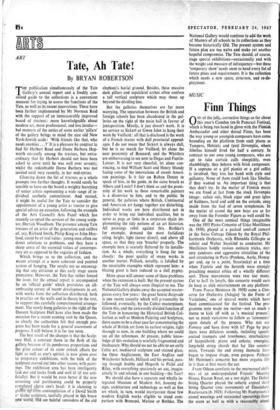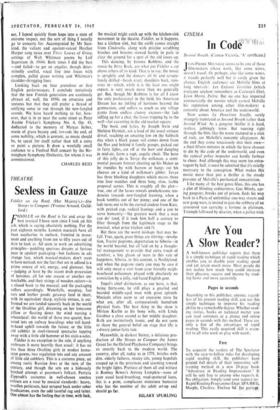Finn Things
MUSIC ONE of the jolly, corrective things so far about this year's Camden (ex-St Pancras) Festival, which is being run hand in glove with the Finnish Ambassador and other dorsal Finns, has been the way young or youngish composers have come bounding on the platform from such places as Tampere, Helsinki and (yes) Jarvenpaa, where Sibelius himself lived for half a century. In contrast to our own young composers, who are apt to take curtain calls sheepishly, even shamblingly, they behave with brisk composure. If a soprano or a girl pianist or a girl cellist is involved, they kiss her hand with style and gallantry. None of them could look like Sibelius if they wanted to. An important thing is that they don't try. In the matter of Finnish music we are freed at last from the stock Jarvenpla image: calico suit, black cigar and great igloo of baldness, hard and cold on the outside, snug inside from the fuel of seven symphonies. In the matter of sound the new boys are as far away from the Founder Figure as well could be.
One of the most comical things imaginable was the 1955 Piano Concerto of Usko Merilainen (b. 1930), played at a packed send-off concert in the Swiss Cottage Odeon by the Royal Phil- harmonic Orchestra, with Rhondda Gillespie as soloist and Walter Susskind as conductor. Mr Merilainen boldly revives ostinato tricks, nur- sery candours and aggressive trivialities of the sort circulating in Paris (Poulenc, Auric, Honeg- ger and, up to a point, Stravinsky) at a time when Tapiola and the Seventh were strongly preaching musical ethics of a wholly different sort. Three movements were two too many. Cut to half its length, this concerto would earn its keep as slick entertainment on any platform.
From Paavo Heininen (b. 1938) came a Con- certo for Orchestra (Adagio) 'in. the Form of Variations,' one of several works which have been commissioned for the festival. The pro- gramme note made me restive—not so much a theme to kick off with as 'a musical process'; not so much variations to follow as 'comments' upon details of the process. Why not say Fantasy and have done with it? Page by page there were delicious sounds, including spatch- cocked trumpets and trombones; interlockings of harpsichord, piano and celesta; emerging. long-held string chords that lay like summer mists. Towards the end strong thematic lines began to impose shape, even purpose. Perhaps Mr Heininen's concerto has more organic life in it than at first meets the ear.
From Odeon comforts to the marmoreal chill- ness of an underpopulated Friends' Meeting House, Euston Road, on a wet night. The Delme String Quartet played the soberly argued third String Quartet (one movement) of Einojuhani Rautavaara (b. 1928). Following Mr Rautavaara's atonal weavings and occasional upsoarih§s from the score as well as with a reasonably attent ear, I lapsed quickly from hope into a state of extreme respect, not the sort of thing I usually go to concerts for. Accompanied by Mr Suss- kind, the valiant and opulent-voiced Heather Harper sang twice over Three Leaves of Grass, settings of Walt Whitman poems by Leif Segerstam (b. 1944). Both times I did my best —and failed—to get an angular, though deter- minedly soulful, vocal line into focus with complex, pallid piano writing and Whitman's shoulder-shrugging lines.
Looking back on four premieres or first English performances, I conclude tentatively that the new Finnish generation are cautiously abreast of, well, the 1950s on structure and textures but that they still prefer a thread of unifying sense to run through the new-fangled sounds. We have heard nothing so far, how- ever, that is in or near the same street as Peter Racine Fricker's Symphony No. 4, Op. 43, dedicated to the memory of Matyas Seiber, music of grave beauty and, towards the end, of some nobility, which is content, as music should be, to speak for itself rather than tell a story or paint a picture. It drew a woefully small audience to a Festival Hall concert by the Bir- mingham Symphony Orchestra, for whom it was commissioned.
CHARLES REID































 Previous page
Previous page